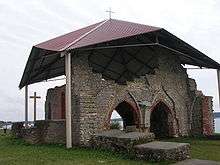Saint Meinhard

Saint Meinhard (died on August 14 or October 11, 1196) was a German canon regular and the first Bishop of Livonia. His life was described in the Chronicle of Henry of Livonia. His body rests in the now-Lutheran Riga Cathedral.
As a canon at the Segeberg Abbey, Meinhard was possibly inspired by Vicelinus missionary work among the Slavs.[1] Meinhard traveled with merchants to Livonia on a Catholic mission to convert pagan Semigallians, Latgalians, and Livonians into Christianity.[2] He settled on the Daugava River at Ikšķile (German: Üxküll) southeast of Riga. In 1185–1186 he built a stone church, dedicated to Our Lady. Following an attack by the Lithuanians, Meinhard brought stonemasons from Gotland to build a fortress to defend against future attacks.[3] These were the first known stone buildings among the Baltic tribes.[3][4] Remains of the church survive to this day. Another stone castle was built in Salaspils (German: Holm) as a gift to newly converted pagans. But the inhabitants rebelled and attacked Meinhard attempting to drive him out of Livonia.[3]
When he briefly returned to Germany in 1186, Meinhard was consecrated as Bishop of Üxküll by Hartwig of Uthlede, Archbishop of Bremen. The new bishopric was confirmed by Pope Clement III in September 1188.[1] In 1190, Clement III allowed any monk to join Meinhard's mission. New Pope Celestine III showed more enthusiastic support for the mission in his letter in April 1193, authorizing active missionary recruitment, making exceptions to rules governing monks' food and clothing, and granting indulgences to those who joined the mission.[1] Among the recruits was Theodorich from Loccum Abbey, who started a mission in Turaida (German: Treyden). Meinhard initially converted the pagans by peaceful means, but faced with resistance and apostasy, he turned to the idea of a crusade.[1]
Meinhard was succeeded by Berthold of Hanover and Albert of Riga, who began the Livonian Crusade and established the Livonian Brothers of the Sword, a crusading military order, in Riga.
References
- 1 2 3 4 Fonnesberg-Schmidt, Iben (2007). The popes and the Baltic crusades, 1147-1254. The Northern World 26. BRILL. pp. 66–68, 73–74. ISBN 90-04-15502-3.
- ↑ Butler, Alban; Jones, Kathleen (2000). Butler's lives of the saints 12. Liturgical Press. p. 283. ISBN 0-8146-2388-3.
- 1 2 3 Turnbull, Stephen R.; Dennis, Peter (2004). Crusader castles of the Teutonic Knights: The stone castles of Latvia and ... Fortress 19. Osprey Publishing. pp. 4–5. ISBN 1-84176-712-3.
- ↑ Jovaiša, Liudas (2008). "Bažnyčia Mindaugo krikšto laikais". Mindaugas karalius (in Lithuanian). Aidai. p. 17. ISBN 9789955656562.
| Catholic Church titles | ||
|---|---|---|
| Preceded by none |
Bishop of Livonia 1186–1196 |
Succeeded by Berthold |
|